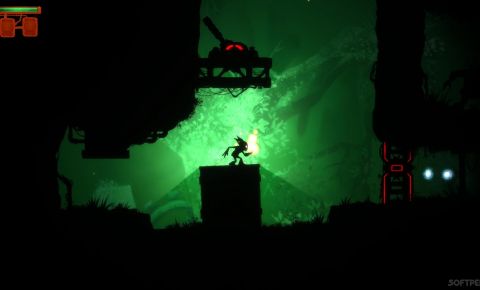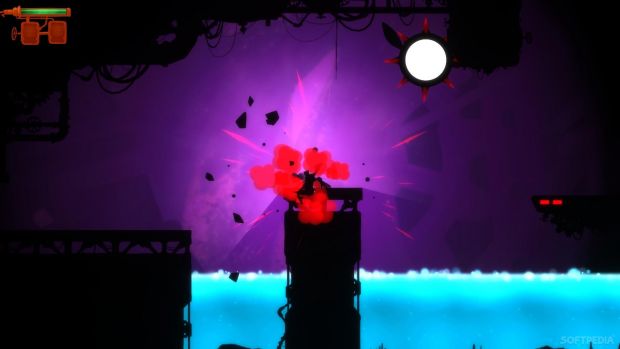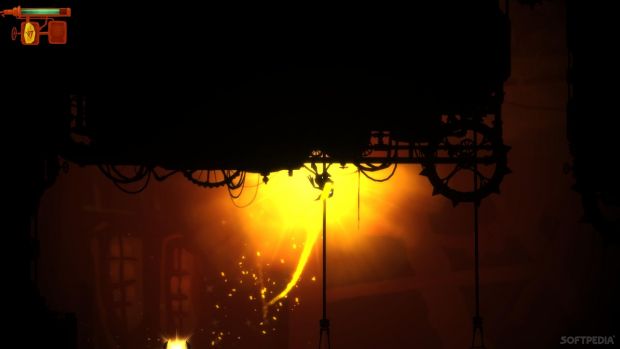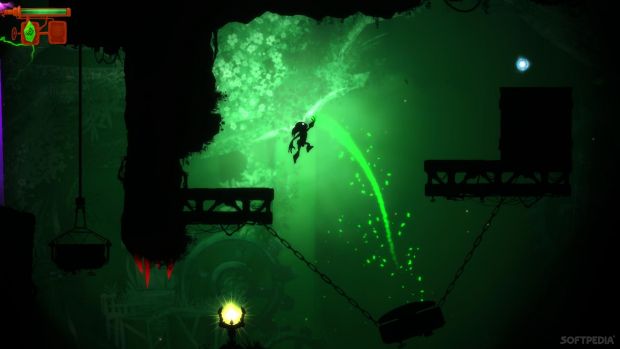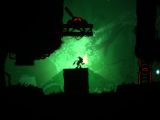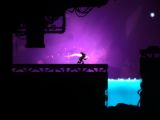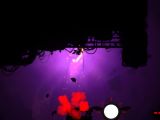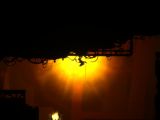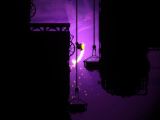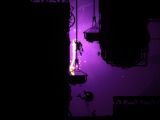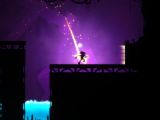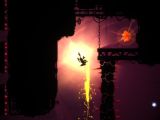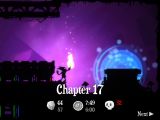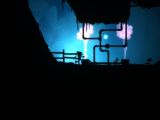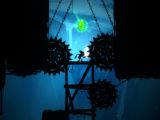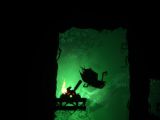Oscura: Lost Light is an indie platformer where you play the role of an apprentice lighthouse keeper who didn't obey his master and touched the Aurora Stone at the top of the structure, causing all light to disappear from the land.
Oscura, the young apprentice, then embarks on a mission to find the pieces of the broken stone and restore light to the Driftlands, in order to stop the creatures of the dark from destroying it.
Of course, things are not always as easy as they sound, and Mavro, the Lord of Shadows, has taken this opportunity to take over the world.
Granted, indie platformers are also a dime a dozen, so let's find out whether this one is worth your time or not.
The game is based on the mobile hits Oscura and Oscura: Second Shadow, greatly expanding their scope and adding more complex mechanics for players to enjoy.
It features an interesting-looking visual style that relies on using contours and shadows, as well as strong colors, to convey its unique world.
Gameplay
Oscura is by no means a fighter, which means that you'll have to stay out of harm's way and avoid enemies, instead of fighting against them.
Fortunately, he does have a few tricks up his sleeve, as touching the Aurora Stone has caused him to gain some exceptional powers, being able to use colored shards to create light that influences his surroundings in various ways.
This means that, in addition to running around and jumping, the classic platformer way to do things, Oscura also has to make use of his special powers in his fight against darkness.
Developer Chocolate Liberation Front offers us a prequel to its previous mobile games, showing the hero's rise to greatness, gradually introducing us to the arsenal of powers that the young adventurer learns to use.
The powers let you manifest pieces of the environment from the ether, reverse gravity, both for you and nearby items, destroy breakable walls, or slow down time, and it's your job to find the right sequence of moves to navigate the eerie world of the Driftlands.
The only catch is that each of the special powers only manifests its effects within the limited area of its glow, which means that proper timing and positioning are a definite requirement in order to achieve progress.
The basic gameplay loop translates into running and jumping or double-jumping around the environment in order to get from one end of the level to the other, mindful to avoid the numerous obstacles lying in your path.
You have to avoid pools of water, spikes, stalactites, vicious monsters, gears, lasers, and pretty much everything that moves and doesn't look flat, because you die instantly, no matter which end of the pointy thing you touch.
Things are pretty basic, and it doesn't take long to master the moveset, apart from a handful of times when dexterity and twitchy movements are required, making it for a frustrating trial and error experience.
However, most of the time, the level design is very interesting, being by far Oscura: Lost Light's biggest strength. The game provides a challenging experience, difficult but not unforgiving, making it easy to lose track of time while exploring its world.
The fact that everything is light based, even the roaming monsters' abilities, means that line of sight plays a pretty important role.
Apart from affecting the various hazards, like your ability to materialize a blob of earth in order to block a lethal laser beam long enough to sneak past it, line of sight also affects your powers, which means that the scene is ripe for some intriguing and challenging puzzles, which the game is happy to deliver.
There are a ton of areas that don't require dexterity or excessive use of your gray matter, being content to allow you to use what you have already learned about the world in order to navigate it, and making it feel more real, instead of a constant obstacle to overcome.
The weird thing is that the process isn't cumulative. You don't start out with nothing and end up with a wide range of abilities to use as you wish, instead you start each level without any crystals and find them as they are needed, which means that there is no sense of progression.
You don't have to work out ways to get past barriers, you just use what's given to you and move on. This enables the designers to create levels where difficult situations arise from the lack of a certain power, in order to not make the game too easy and make you work to get to the end, but at the same time there is no organic feeling of growth.
This, however, isn't as jarring as one of the game's most annoying faults, the unresponsive controls and inability to grab onto ledges. Sometimes it's hard to make Oscura land where you want him to, because he has a bit of inertia, just enough to make him narrowly miss platforms in the hairiest of situations.
Furthermore, the hit detection around ledges is a bit funky too, causing him to slip off and fall at times, making you feel like you just earned yourself another unfair death.
However, that doesn't detract that much from the experience, since you will die a lot anyway, which makes the faulty deaths less noticeable overall, unless they're around a wonky checkpoint.
Due to the numerous hazards and instant death, each level is laden with checkpoints, some of them only a couple of seconds and jumps away from each other. This, together with the fact that you instantly respawn after death, makes it seem less punishing and more prone to experimentation.
“Most of the time, the level design is very interesting, being by far Oscura: Lost Light's biggest strength. The game provides a challenging experience, difficult but not unforgiving, making it easy to lose track of time while exploring its world.”
Sure, it's still a tedious trial and error affair at times, but overall, you generally have checkpoints before each challenging portion of a level, removing the need to go over and over through the same content only to narrowly miss a jump or randomly impale yourself at the end.
Some of the checkpoints, however, aren't placed all that inspired, since there are moments when the difficulty spikes and you have to make several leaps of faith and dexterous maneuvers in order to get to the other side, but overall, their generous number is a godsend.
Another thing that irked me was the fact that, although you can only carry two colored crystals at any given time, they are not bound to two separate keys or buttons, but instead you have a key to activate the power and another one to cycle through the crystals, which makes it quite difficult to use them right in some scenarios.
It's weird and it makes more difficult stuff later on feel pointlessly annoying, since many times you have to use a power to break a wall and then cycle to the next one to reverse gravity or slow down a moving object in the span of a single jump, which feels really wonky with the cycle mechanic.
In any case, although these gripes hold the game back, they don't break it by any stretch of the imagination. Sure, you're bound to be frustrated at times, but the overall experience is pretty smooth and satisfying.
Visuals and sound
The silhouette aesthetic works really well, making it very easy to discern between friend and foe, usable ledge and moving gear that's just waiting to cut you in half, while also providing a satisfying visual experience.
While not as atmospheric and eerie as Limbo, Oscura: Lost Light manages to capture one's attention to the rich use of contours, making its world feel detailed and alive, in spite of it being shrouded in darkness.
The use of bright neon colors, light sources and shadows, together with the many decorative contours throughout the game world, makes it for a very interesting and appealing visual experience.
You can always tell whether something is going to kill you or not, or what the things you should stay away from are, and which platforms are within your reach.
The sound and music track do their job well, eliciting a feeling of uneasiness, conveying the sense of a busy underground industrial facility, or whatever else needs to be suggested. The sound design is subtle and complements the gameplay, contributing to a richer overall experience.
The Good
- Stylish visuals
- Neat gameplay mechanics
- Challenging
- Pretty good level design
The Bad
- It relies too much on trial and error
- Some quirks and bugs
- Wonky controls
Conclusion
Everything that it offers has been done before, but if you're fine with that and enjoy some interesting and challenging levels and a pleasant visual experience, then it's a pretty safe bet.
While the story isn't all that great, being as cliché as you can get, it still provides a certain feeling of direction. In any case, the game isn't about narrative, but about platforming, and it does that decently enough.
It doesn't have enough personality and creativity to make it truly memorable, but it's definitely an enjoyable and challenging game if you're into platformers. Also, the fact that you can remap the keys and use a control scheme you're more comfortable with, if you're not using a gamepad, is a definite plus.
 14 DAY TRIAL //
14 DAY TRIAL // 